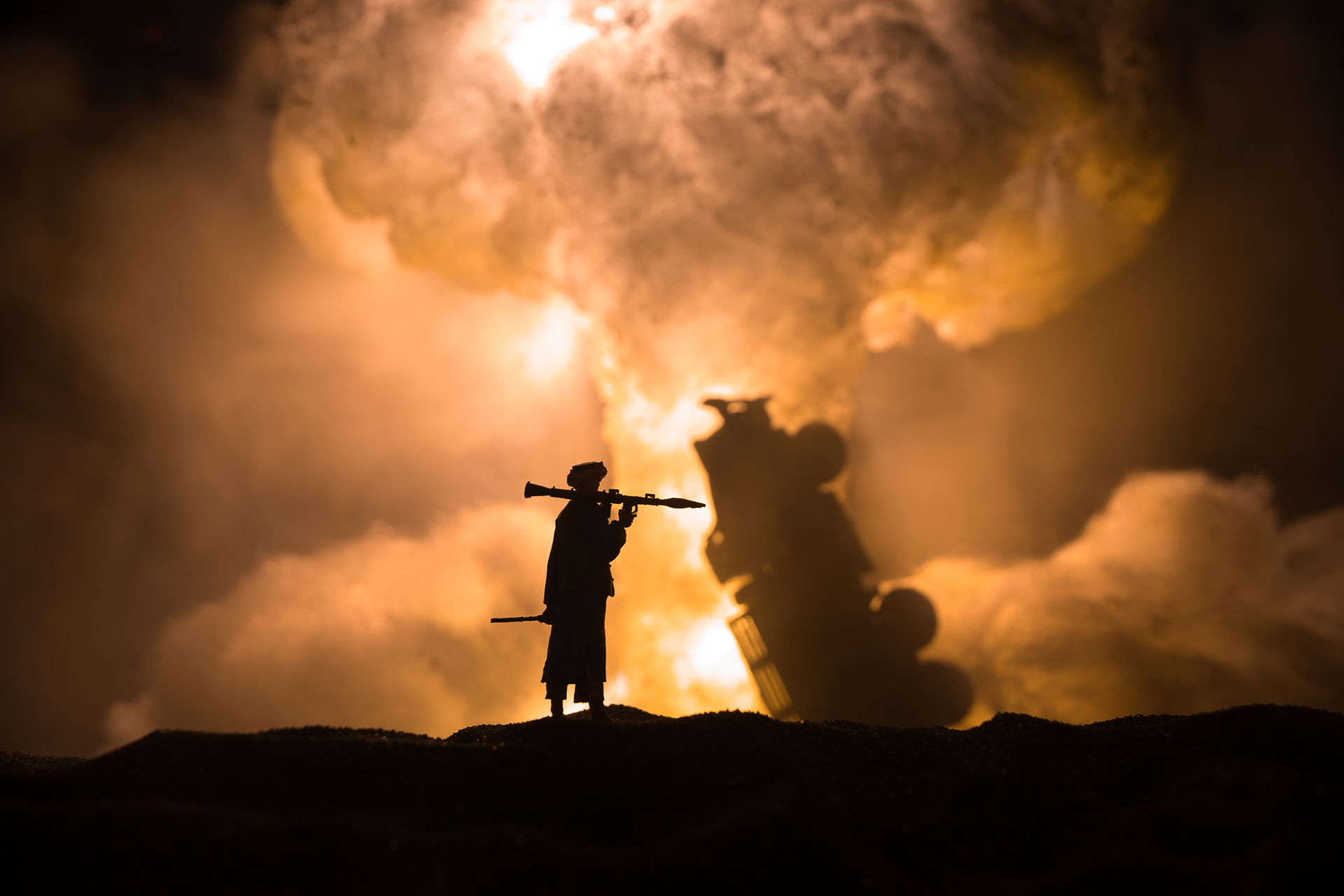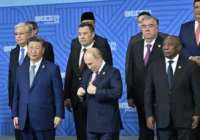The Taliban returned to power in Afghanistan in August 2021 after waging a 20-year insurgency with support from Pakistan and, to some extent, from Iran. Now that the Taliban is in charge, the direct and indirect influence of Islamabad over Afghanistan is profound. In fact, many observers question the national legitimacy of the Taliban because they are seen as a proxy for Pakistan.
The Taliban is the product of Pakistan’s proxy wars driven by ideology. Thousands of religious madrassas that have taught millions promote extremism and violence. Their curriculum was developed in the 1980s for the mujahideen to unleash violence on Soviet troops. As is well known, the US and Saudi Arabia supported the mujahideen during the Cold War. In fact, hardline Saudi Wahhabi ideology deeply influenced the madrassas, the mujahideen and the Taliban.
When the US decided to withdraw from Afghanistan, the government collapsed and the Pashtun-led Taliban took over. Much of the world was stunned by this speedy takeover. Pakistan was the only major actor prepared for this development. Note that the Taliban took over on August 15, 2021 and, as early as September 4, Lieutenant General Faiz Hameed, the chief of Pakistan’s Inter-Services Intelligence (ISI), was in Kabul. Hameed helped settle the Taliban’s internal disputes and paved the path for a caretaker government.
The same thing but different context
In many ways, the Taliban’s victory is a repetition of Afghanistan’s history. The 2020 US-Taliban deal was consistent with the 1988 Afghanistan-Pakistan Geneva Accords. That deal paved the way for the Soviet withdrawal and, subsequently, the collapse of the Afghan government. For many Afghanistan experts, the US “peace” negotiation with the Taliban was a “proxy peace” process.
Afghanistan’s government was excluded from the 2020 deal. The US made a deal with a misogynistic, ethnonationalist, fundamentalist terrorist organization and abandoned the democratically elected government. This led to its speedy collapse.
Once the Taliban took over Kabul, they captured all the institutions of the state that had been built over 20 years since 2001. The previous Taliban regime fell because the US intervened after the 9/11 attacks in 2001. Now, the Taliban are back and they have captured billions of dollars worth of US military equipment, which they are using to consolidate their power.
Although there is uncertainty in the region concerning the Taliban’s future, regional players, such as Pakistan, Iran, Russia, and China, have adopted a strategy of pragmatic engagement. The Taliban also control all sources of the country’s income, which sustains their forces and protects their regime.
Contrary to the rhetoric and promises of the so-called Taliban 2.0, they have been pursuing the same brutal policies that characterized their reign in the 1990s. Extrajudicial killings, ethnic cleansing, discrimination against women and other oppressive measures are back. They have trampled civil society and lack political legitimacy.
The Talibanization of Afghanistan’s society is proceeding swiftly. They are building thousands of madrassas to promote their radical ideology. They have banned schools for girls, changed the education curriculum and impose their radical interpretations of Islam upon an ethnically diverse nation.
The Taliban have also maintained their relationship with terrorist groups such as al-Qaeda. The killing of Aiman al-Zawahiri by the US on July 31, 2022 in Kabul demonstrates that the Taliban is still harboring top leaders of al-Qaeda and is a haven for terrorists.
Brutal repression, little legitimacy
The Taliban have imposed a primitive totalitarian regime on a diverse country. They have failed to create a formal political process or a vision for the country. Instead, the Taliban have used violence, rural Pashtun tribalism and hardline Islamic Sharia law on ethnic groups with very different cultures. They are marginalizing and often killing non-Pashtuns, particularly the Shia Hazaras.
Pashtuns are now in-charge of Hazara areas. Naturally, the Hazaras feel their homeland has been occupied. The Taliban have also changed signs in universities from Farsi to Pashto even in Persian-speaking areas such as Balkh in the north. Signs outside ministries are also in Pashto. Naturally, non-Pashtuns are not pleased.
The Taliban’s policy toward women is extremely harsh. They have re-instituted their “gender apartheid,” decimating existing women’s rights, such as their right to travel, work, education, and participate in public life. Torture and extra-judicial killings are now common practice.
The Taliban’s highly centralized model of governance does not, cannot and will not function well. Once, Afghanistan’s kings had the mandate to control the country on behalf of a colonial power through a highly centralized system. This history created a highly centralized model of governance and fostered a psychology of ethnic domination within the Pashtun elites. The Taliban are deeply committed to this model.
This centralized model has taken a hit. Both during the Soviet occupation and the 20-year democratic experiment, concentration of power abated. Unsurprisingly, the anti-Taliban fronts are calling for a decentralized political setup. Centralization is associated with brutality, dysfunction, and a crisis of legitimacy. The current centralization is no different. It is brutal, violent and oppressive.
The Taliban rejects elections and rules the country without any formally-defined constitution or system of checks and balances. There are no political processes that establish legitimacy. Most of the Taliban leaders and commanders are not familiar with Afghan society, and they cannot speak Persian, the lingua franca of the country.
The Taliban has also failed to behave like a normal state at the international level. No country has recognized them even when they are compelled to interact with the Taliban. Even Pakistan did not recognize them unilaterally. Their links with terrorist groups have been an added concern.
It seems unlikely that the Taliban should succeed in the long term. Their Pashtun ethnonationalism, Islamic fundamentalism, violent oppression and extreme centralization does not work in multiethnic Afghanistan. As proxies of Pakistan, the Taliban do not even command legitimacy among all Pashtuns.
More war and the danger of mass atrocities
The situation in Afghanistan is moving towards another round of conflict. The people are finally rising up against the brutal regime. In recent months, an insurrection is increasing in the north. The Taliban is crushing this with its customary savagery. The international community has largely overlooked war crimes in the north but resistance is strengthening.
In the online sphere, the “#StopHazaraGenocide” has been tweeted more than 17 million times and sparked protests in cities around the world, which shows that the Taliban failed to provide security. As mass atrocities continue, so do protests. Women are protesting too. Hundreds of them have taken to the streets in the provinces of Kabul, Balkh, Bamiyan, Herat and Ghazni since the return of the Taliban to power but were repressed by the Taliban.
Given rising protests, the Taliban are likely to find it difficult to rule. To support the people, the international community must systematically monitor and document violence in Afghanistan. The Security Council and the Human Rights Council at the UN have a critical role to play. Overlooking the Taliban’s violence and building relationships with them is a bad idea. It sends a signal that they can continue their repressive rule. The international community must put pressure on the Taliban to to stop human rights violations, recommence girls education, and conduct political dialogue with other ethnicities, groups and stakeholders. If the international community fails to act, there will be even more death and suffering in Afghanistan.
The views expressed in this article are the author’s own and do not necessarily reflect Fair Observer’s editorial policy.
Support Fair Observer
We rely on your support for our independence, diversity and quality.
For more than 10 years, Fair Observer has been free, fair and independent. No billionaire owns us, no advertisers control us. We are a reader-supported nonprofit. Unlike many other publications, we keep our content free for readers regardless of where they live or whether they can afford to pay. We have no paywalls and no ads.
In the post-truth era of fake news, echo chambers and filter bubbles, we publish a plurality of perspectives from around the world. Anyone can publish with us, but everyone goes through a rigorous editorial process. So, you get fact-checked, well-reasoned content instead of noise.
We publish 2,500+ voices from 90+ countries. We also conduct education and training programs
on subjects ranging from digital media and journalism to writing and critical thinking. This
doesn’t come cheap. Servers, editors, trainers and web developers cost
money.
Please consider supporting us on a regular basis as a recurring donor or a
sustaining member.
Will you support FO’s journalism?
We rely on your support for our independence, diversity and quality.







Comment